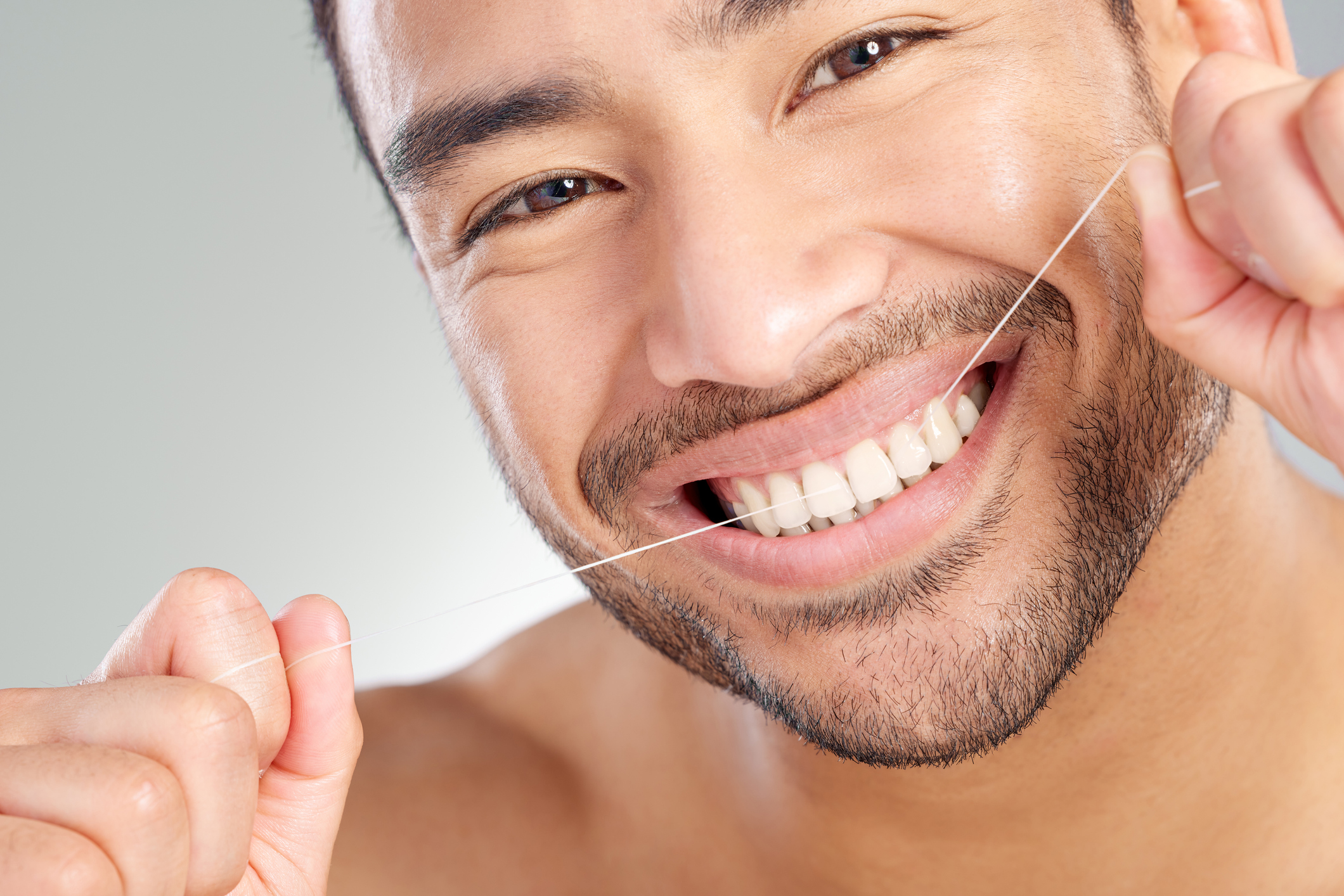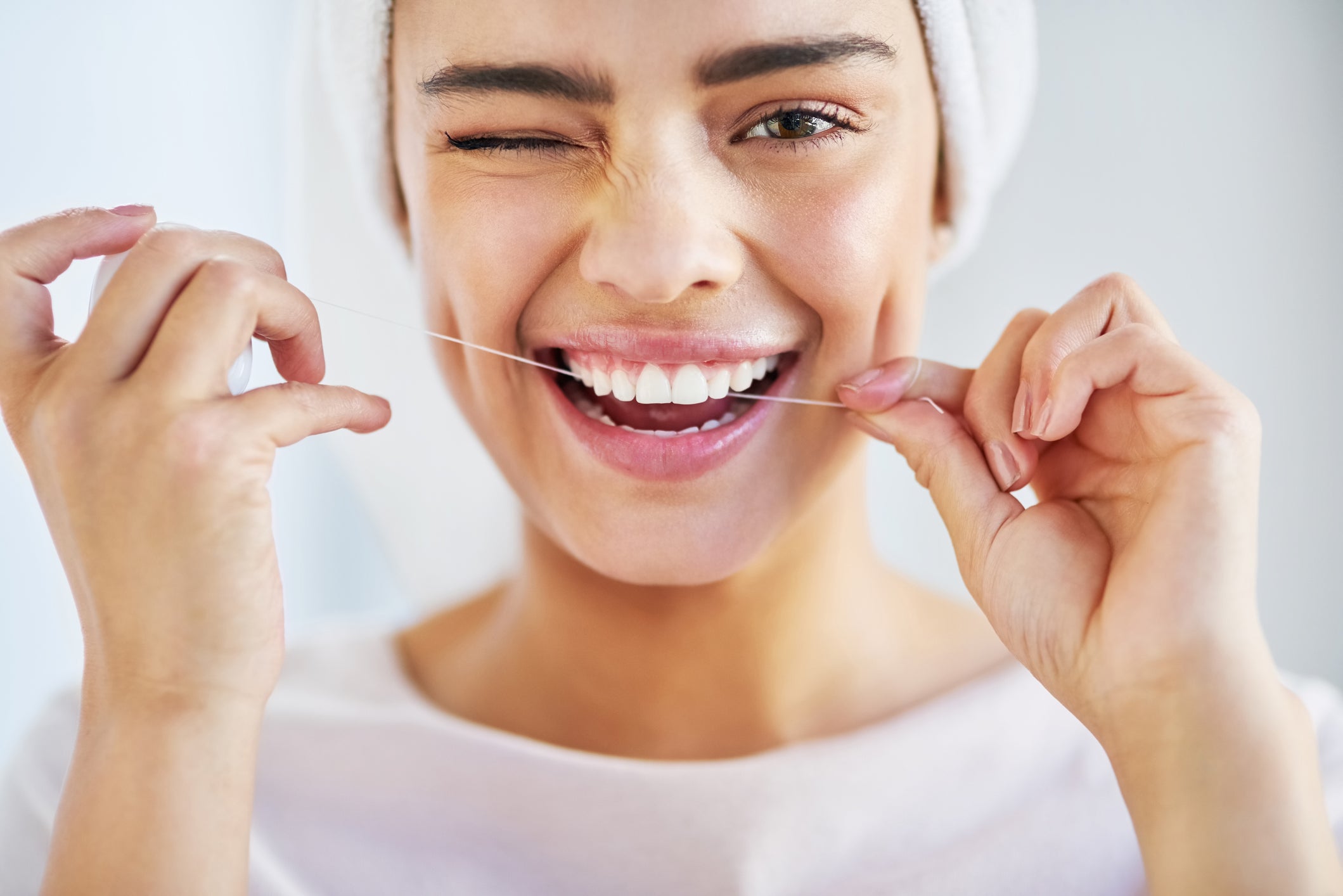-
Tips and Advice for Flossing in Recognition of National Flossing Day

Man taking care of teeth by making sure to floss.
National Flossing Day is right around the corner, and whereas it might be slightly overshadowed by Thanksgiving and Native American Heritage Day, it’s still a great time to give three cheers for the unsung hero of dental hygiene, the modest waxed string we know as dental floss.
Why Should You Floss?
Most of the daily emphasis on toothcare is on brushing, which removes bacteria, food, and grime from the surface of the teeth. But where flossing truly shines is in getting into those hard-to-reach spaces in between teeth and close to the gum line, where regular toothbrushes can’t reach. Flossing helps fight gingivitis and periodontitis, reducing the risk of gum inflammation and cavities. Flossing also helps promote fresh breath by removing the food and bacteria that collects between your teeth.
Tips for Effective Flossing
- Choose the Right Floss:
- There are various types of dental floss available, including waxed, unwaxed, flavored, and wider tape-style floss. Choose the one that feels most comfortable and effective for you.
- Establish a Routine:
Make flossing a daily habit. Aim to floss at least once a day, ideally before bedtime, to remove accumulated plaque and food particles.
- Proper Technique:
-
- Start with an 18-inch (45 cm) length of floss. Wind most of it around one finger on each hand, leaving about 1-2 inches (2-5 cm) of floss to work with.
-
- Gently slide the floss between your teeth using a sawing motion. Avoid snapping it into place, which can harm your gums.
-
- Curve the floss around the base of each tooth, forming a C-shape, and gently glide it up and down. Be gentle to avoid damaging your gums.
-
- Use a fresh section of floss for each tooth to avoid transferring bacteria.
- Be Patient:
-
- Take your time when flossing to ensure thorough cleaning. Rushing can lead to incomplete removal of plaque and debris.
- Keep Flossing Agents Handy:
- Keep floss in your purse, briefcase, backpack or satchel. Floss picks are also a convenient minimal device for a quick cleaning when out and about.
- Use Flossing Aids:
-
- If traditional flossing is challenging, consider using floss picks, interdental brushes, or water flossers. These tools can make the process more accessible and convenient.
- Teach Children Early:
-
- Encourage good oral hygiene habits in children by teaching them to floss as soon as part of your family culture. Child-friendly floss and flossers are available.
- Avoid “Bleeding Gums” as an Excuse:
-
- If your gums bleed when you first start flossing or after a break, don’t be discouraged. This is a sign of gum inflammation and indicates the need for regular flossing to improve gum health.
- Set Reminders:
-
- Use phone alarms or other reminders to ensure you don’t forget to floss daily, especially if you’re establishing a new habit.
Call Park 56 Dentistry to Celebrate
Our dental professionals are always available to celebrate National Flossing Day with you, to help you analyze your flossing technique, or to offer advice on the best type of floss for you. November is also a great time to contact us and schedule your end-of-year cleaning or get on the schedule after the new year.
-
Simple Ways to Motivate You to Floss Every Day

Good oral hygiene is important for a healthy mouth, and one of the most effective ways to achieve it? That’s right—flossing! Flossing is one of the most important habits you can adopt to maintain good oral health. According to research, only 4 out of 10 adults floss daily and only 1 in 3 actually flosses correctly. Daily flossing helps prevent cavities, gum disease, and bad breath. But sometimes it’s hard to remember to do it every day. So here are some simple motivators that might help you get into the habit of regular flossing.
Find a Flossing Product That Works for You
The type of floss you use matters! Many people don’t realize that different types of floss work differently for different types of teeth and mouth needs. Waxed, non-waxed, disposable floss sticks, electric or water flossers—there are so many options available! If one type of product isn’t working well with your teeth and gums, try another! Experiment with different products until you find the perfect one for your personal oral hygiene routine.
Keep Your Floss in Sight
If you have your dental floss handy, you are more likely to remember to use it every day! Try keeping an extra package at the office or even in your pocket or purse wherever you go. You should also keep a container on the sink or bathroom countertop as a constant reminder that it’s time to floss every day!
Set A Goal
One of the best ways to make sure you stick with something is to set a goal. Make a goal that you can realistically achieve, like “I will floss at least twice a week for the next month.” Once you reach that goal, reward yourself by doing something special or purchasing something nice! This will help motivate you to keep going and eventually make daily flossing part of your routine.
Create A Chart
If setting goals isn’t quite your thing, another way to motivate yourself is by creating a chart or calendar that tracks your progress. Every day after you floss, mark it off in your chart or on your calendar as a reminder that you achieved your goal for the day. Seeing this progress can give you an added boost of motivation and encouragement!
Use A Reminder App
If neither of these methods seem like they’d work for you, consider downloading a reminder app onto your phone or laptop. With this type of app, all you have to do is set the time when you want it to remind you each day–it could be right before bedtime, so it becomes part of your nighttime routine–and then just follow through with the action when the reminder goes off!
Get Flossing!
Flossing every day is an important part of maintaining good oral hygiene and overall health. And while remembering to do it can be difficult at times, there are several easy strategies available that can help motivate and remind us so that we don’t forget! Whether it’s setting goals and rewarding yourself for reaching them, using visuals like charts and calendars, or using apps on our phones for reminders—these simple strategies can help ensure we stick with our daily flossing routine.
If any questions remain about flossing or other dental-related topics such as teeth whitening services offered at Park 56 Dental in New York City, please contact us today!
RECENT POSTS
categories
- Uncategorized
- Cosmetic Dentistry
- Veneers
- Healthier Teeth
- Teeth Whitening
- Dental Health
- Video
- Dental Emergencies
- Invisalign
- Dental Implants
- Root Canal
- Sedation Dentistry
- Infographic
- Dental Crowns and Bridges
- Dental Anxiety
- Gum Disease
- COVID-19
- Bad Breath
- New York Dentist
- Cut out sugar
- General Dentistry
- Oral Health
- Oral Cancer
- Dry Mouth
- Gum Health
- Toothache
- Dental Sealants
- Cavities
